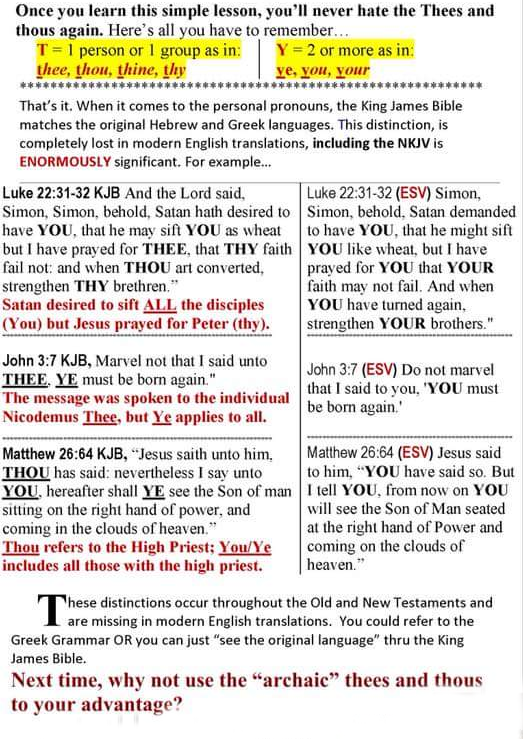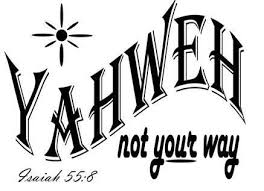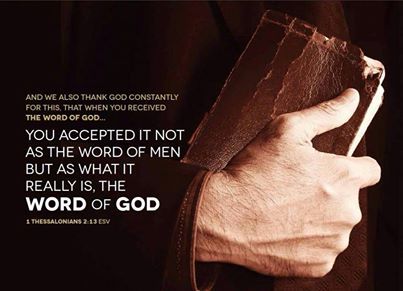- Jul 22, 2014
- 41,502
- 7,861
- Country
- United States
- Faith
- Non-Denom
- Marital Status
- Married
Explaining The Problem of the Footnotes
in Modern Translations
That Cast Doubt on the Accepting
Mark 16:9-20, &
John 7:53 through John 8:1-11
as the Word of God.
Mark 16:9-20 and John 7:53-John 8:1-11 include a forward footnote in certain Modern Translations and some say that it may not be in the original manuscripts. This is problematic because it casts doubt on whether God preserved His Word or not or that His Word is trustworthy.
As for Mark 16:9-20:
Well, there are two major problems with this footnote on this passage that leads to unbelief in God’s Word.
First problem: If we cast doubt on whether Jesus said for us to preach the gospel to every creature, then it no longer becomes a necessity. The devil would love nothing more than for us to not to have a desire to preach to every creature or person. This is far different than Paul saying “I determined not to know any thing among you, save Jesus Christ, and him crucified.” Paul did not say to go out and preach the gospel to every creature. Jesus did. This is important because it is a part of our great commission. If we lose focus of that, we lose focus of spreading the love of the truth to ALL others that can save them. Jesus wanted all to be saved by the gospel by us preaching to every creature (person) the good news of salvation. This aspect of the great commission shows also the scope of our mission. Should we just preach to some or a few and that’s good? Jesus says to preach to every creature.
Second problem is that if we believe the footnote and doubt the truth of the disciples not believing the account of the women and the two men on the Road to Emmaus, then we can fall prey to thinking that we can never fall into unbelief on certain things involving what God says, too. We may think we are infallible and know it all. Therein lies the danger because they are an example to us today to always be listening closely to what God’s Word says.
As for John 7:53-John 8:1-11:
I have run into a Christian online before who believes the beginning part of John 8 is not in his Bible. No doubt this was the result of him believing either the footnotes in Modern Translations or from believing a scholar who is in the Modern Translation camp.
Is he correct? No.
For I can prove to you the beginning part of John 8 is in your Bible.
What did Jesus write on the ground in John 8?
John 4:14 says,
John 7:37-39 says,
This relates. We can know what Jesus was writing in the ground when the Jews tested him in regards to the woman caught in the act of adultery by looking at other Scripture. By Scripture, we see a reference to the LORD [Jesus], the fountain of living waters [the Holy Spirit].
Jeremiah 17:13 says,
Note 1: The words in brackets in light blue (above) is my commentary to the text.
Note 2: Words in bright red are references to the Holy Spirit. Words in green is in reference to the Tree of Life, the door (wood, tree), who is Jesus.
Note 3: In the words in the above verse, you will notice that they (the Jews) that were accusing Jesus in regards to the woman caught in the act of adultery, their names were written down in the earth. This is what Jesus was writing in the Earth. Jesus was writing down the names of those who had forsaken the Lord. I highlighted the words in purple above in Jeremiah to show that their names written in the earth as we behold in the scene in John 8.
Note 4: We tie this together because of the words, "the LORD, the fountain of living waters" in Jeremiah 17:13 is tied to John 7:38 that says, "out of his belly shall flow rivers of living water."
Again, John 7:38 says,
Here is the scene with Jesus writing in the ground with the Jews in regards to the woman caught in the act of adultery:
John 8:4-6 says,
What is interesting is that the very previous chapter (John 7), we are told that anyone who believes in Jesus out of his belly shall flow rivers of living water. Yet, in Jeremiah 17:13, we learn that this fountain of living waters is what these Jews rejected and their names were written in the ground because they forsaken the Lord.
So yes. It's true. John 8:1-11 (along with John 7:53) belongs in our Bible.
The testimony of the whole of Scripture confirms this.
Therefore, in conclusion: The whole “footnotes thing casting doubt on John 8 belonging in our Bible” is erroneous. The same is true for Mark 16:9-20, as well.
Believe your King James Bible.
in Modern Translations
That Cast Doubt on the Accepting
Mark 16:9-20, &
John 7:53 through John 8:1-11
as the Word of God.
Mark 16:9-20 and John 7:53-John 8:1-11 include a forward footnote in certain Modern Translations and some say that it may not be in the original manuscripts. This is problematic because it casts doubt on whether God preserved His Word or not or that His Word is trustworthy.
As for Mark 16:9-20:
Well, there are two major problems with this footnote on this passage that leads to unbelief in God’s Word.
First problem: If we cast doubt on whether Jesus said for us to preach the gospel to every creature, then it no longer becomes a necessity. The devil would love nothing more than for us to not to have a desire to preach to every creature or person. This is far different than Paul saying “I determined not to know any thing among you, save Jesus Christ, and him crucified.” Paul did not say to go out and preach the gospel to every creature. Jesus did. This is important because it is a part of our great commission. If we lose focus of that, we lose focus of spreading the love of the truth to ALL others that can save them. Jesus wanted all to be saved by the gospel by us preaching to every creature (person) the good news of salvation. This aspect of the great commission shows also the scope of our mission. Should we just preach to some or a few and that’s good? Jesus says to preach to every creature.
Second problem is that if we believe the footnote and doubt the truth of the disciples not believing the account of the women and the two men on the Road to Emmaus, then we can fall prey to thinking that we can never fall into unbelief on certain things involving what God says, too. We may think we are infallible and know it all. Therein lies the danger because they are an example to us today to always be listening closely to what God’s Word says.
As for John 7:53-John 8:1-11:
I have run into a Christian online before who believes the beginning part of John 8 is not in his Bible. No doubt this was the result of him believing either the footnotes in Modern Translations or from believing a scholar who is in the Modern Translation camp.
Is he correct? No.
For I can prove to you the beginning part of John 8 is in your Bible.
What did Jesus write on the ground in John 8?
John 4:14 says,
"...the water that I shall give him shall be in him a well of water springing up into everlasting life."
John 7:37-39 says,
37 "In the last day, that great day of the feast, Jesus stood and cried, saying, If any man thirst, let him come unto me, and drink.
38 He that believeth on me, as the scripture hath said, out of his belly shall flow rivers of living water.
39 (But this spake he of the Spirit, which they that believe on him should receive: for the Holy Ghost was not yet given; because that Jesus was not yet glorified.)"
38 He that believeth on me, as the scripture hath said, out of his belly shall flow rivers of living water.
39 (But this spake he of the Spirit, which they that believe on him should receive: for the Holy Ghost was not yet given; because that Jesus was not yet glorified.)"
This relates. We can know what Jesus was writing in the ground when the Jews tested him in regards to the woman caught in the act of adultery by looking at other Scripture. By Scripture, we see a reference to the LORD [Jesus], the fountain of living waters [the Holy Spirit].
Jeremiah 17:13 says,
"O LORD, the hope of Israel, all that forsake thee shall be ashamed, and they that depart from me shall be written in the earth, because they have forsaken the LORD [i.e. Jesus], the fountain of living waters [i.e. the Holy Ghost]."
Note 1: The words in brackets in light blue (above) is my commentary to the text.
Note 2: Words in bright red are references to the Holy Spirit. Words in green is in reference to the Tree of Life, the door (wood, tree), who is Jesus.
Note 3: In the words in the above verse, you will notice that they (the Jews) that were accusing Jesus in regards to the woman caught in the act of adultery, their names were written down in the earth. This is what Jesus was writing in the Earth. Jesus was writing down the names of those who had forsaken the Lord. I highlighted the words in purple above in Jeremiah to show that their names written in the earth as we behold in the scene in John 8.
Note 4: We tie this together because of the words, "the LORD, the fountain of living waters" in Jeremiah 17:13 is tied to John 7:38 that says, "out of his belly shall flow rivers of living water."
Again, John 7:38 says,
"He that believeth on me, as the scripture hath said, out of his belly shall flow rivers of living water."
Here is the scene with Jesus writing in the ground with the Jews in regards to the woman caught in the act of adultery:
John 8:4-6 says,
4 "They say unto him, Master, this woman was taken in adultery, in the very act.
5 Now Moses in the law commanded us, that such should be stoned: but what sayest thou?
6 This they said, tempting him, that they might have to accuse him. But Jesus stooped down, and with his finger wrote on the ground, as though he heard them not. "
5 Now Moses in the law commanded us, that such should be stoned: but what sayest thou?
6 This they said, tempting him, that they might have to accuse him. But Jesus stooped down, and with his finger wrote on the ground, as though he heard them not. "
What is interesting is that the very previous chapter (John 7), we are told that anyone who believes in Jesus out of his belly shall flow rivers of living water. Yet, in Jeremiah 17:13, we learn that this fountain of living waters is what these Jews rejected and their names were written in the ground because they forsaken the Lord.
So yes. It's true. John 8:1-11 (along with John 7:53) belongs in our Bible.
The testimony of the whole of Scripture confirms this.
Therefore, in conclusion: The whole “footnotes thing casting doubt on John 8 belonging in our Bible” is erroneous. The same is true for Mark 16:9-20, as well.
Believe your King James Bible.
Last edited:
Upvote
0






